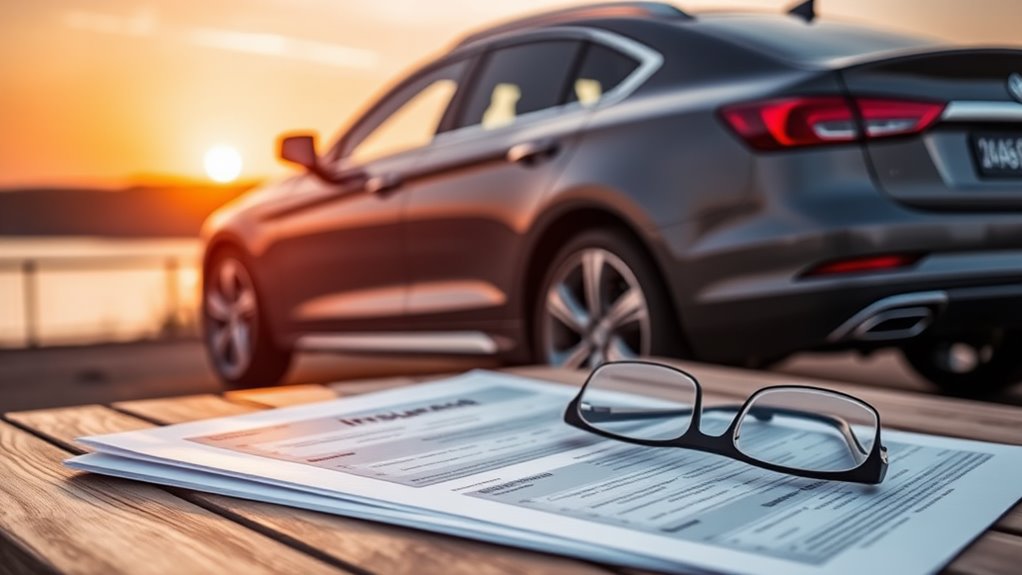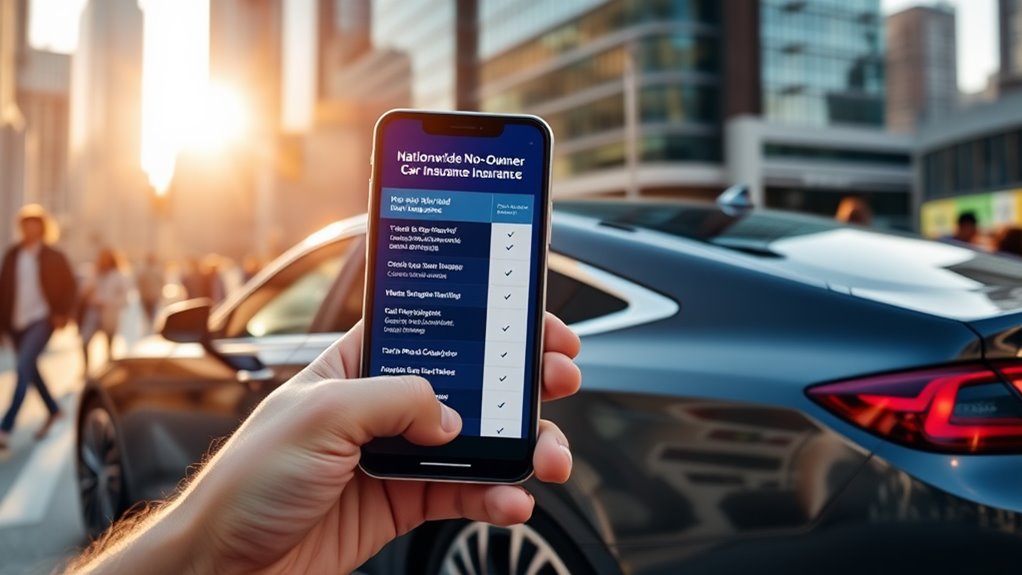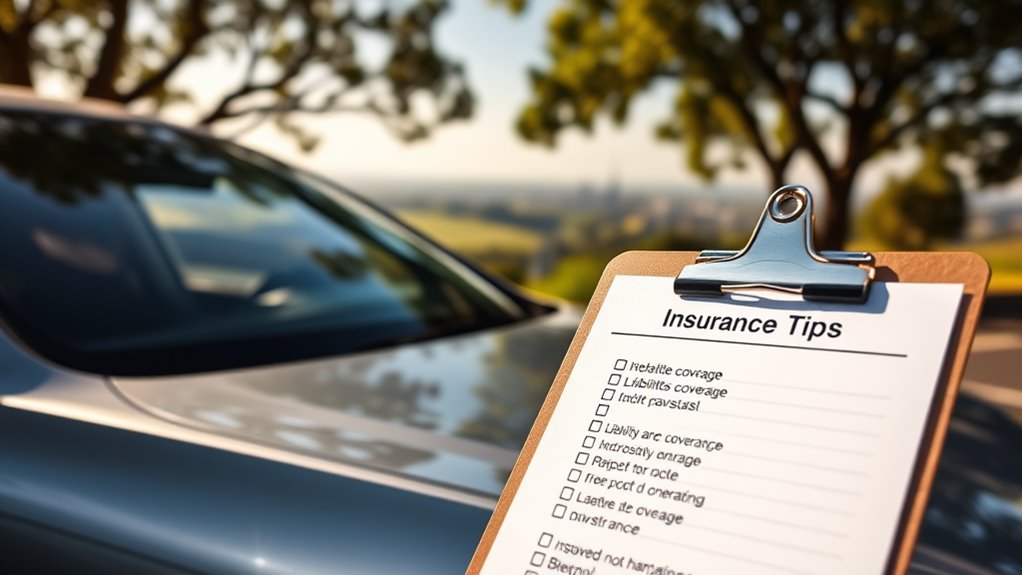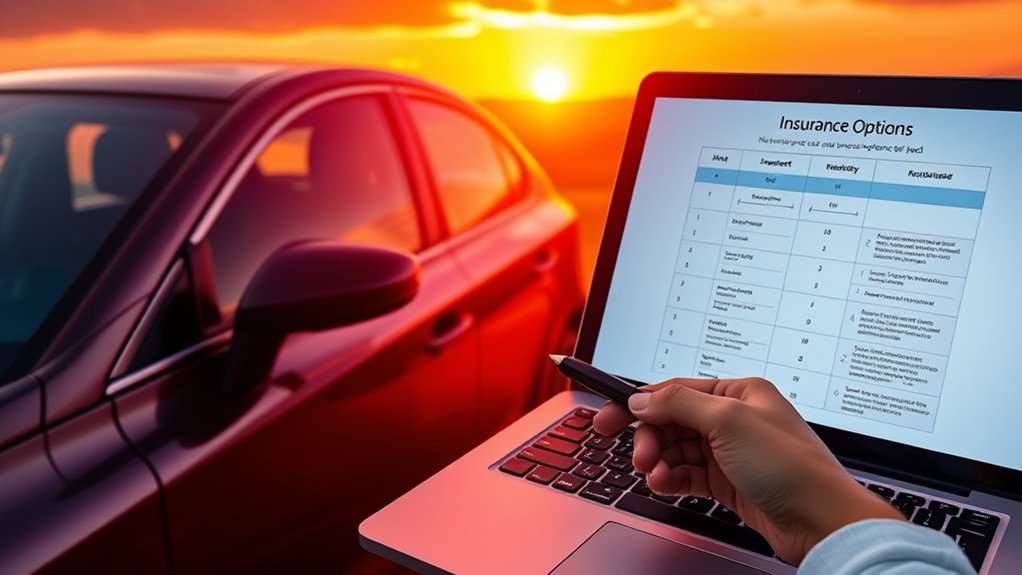Maneuvering the world of car insurance can feel like steering through a winding road. If you often drive vehicles you don’t own, understanding non-owner car insurance is vital. This type of insurance provides essential liability protection, but it also comes with specific exclusions and requirements that can impact your coverage. Are you aware of what it truly entails and whether it’s the right fit for your needs?
Key Takeaways
- Non-owner car insurance provides liability coverage for individuals who drive but do not own a vehicle, protecting against bodily injury and property damage.
- This policy serves as secondary coverage when using borrowed or rented vehicles, ensuring adequate protection if the vehicle’s insurance is insufficient.
- Average annual costs for non-owner insurance range from $325 to $795, with potential savings compared to traditional car insurance policies.
- Essential application requirements include a valid driver’s license, proof of residency, and a driving history record to determine premium rates.
- Non-owner policies do not cover vehicle damage or personal injuries to the driver, focusing solely on liability and medical expenses for others.
What Is Non-Owner Car Insurance?

Non-owner car insurance is a specialized type of coverage designed for individuals who drive but don’t own a vehicle. It provides essential liability coverage, ensuring you’re protected against bodily injury and property damage claims when driving someone else’s car.
This policy acts as secondary coverage, stepping in when the borrowed vehicle’s insurance falls short. While it covers medical expenses for others, it excludes collision or extensive coverage for the vehicle itself. Additionally, it helps maintain a continuous insurance history, which can prevent future rate increases. Non-owner car insurance is generally more affordable than standard policies, making it a practical option for those who rent cars frequently or share vehicles without regular access. Furthermore, it is ideal for individuals who frequently borrow cars from friends or family.
Who Should Consider Non-Owner Car Insurance?
If you frequently borrow vehicles or rent cars, non-owner car insurance might be the right choice for you. This coverage can provide essential benefits for various situations.
Consider it if you:
Consider non-owner car insurance if you frequently drive others’ vehicles or rent cars for added liability protection.
- Regularly drive someone else’s car and want secondary liability coverage.
- Rent cars often and prefer a cost-effective alternative to rental company fees.
- Maintain continuous insurance to avoid lapses that raise future premiums.
- Work as a gig worker or employee using personal vehicles for business tasks. Non-owned automobile insurance helps bridge gaps in coverage and offers financial protection, ensuring you remain compliant with legal requirements while driving vehicles that aren’t yours.
It’s a smart move for anyone needing reliable protection without owning a car.
Coverage Types Offered in Non-Owner Policies
Understanding the coverage types offered in non-owner car insurance policies is essential for drivers who frequently rely on borrowed or rented vehicles.

These policies typically include liability coverage, protecting you from damages to others if you cause an accident. Uninsured/underinsured motorist protection offers financial compensation for injuries inflicted by drivers lacking sufficient insurance. Medical payments cover your medical expenses, while personal injury protection provides broader coverage for personal injuries resulting from accidents.
However, it’s important to note that non-owner policies don’t cover damage to the vehicle you’re driving, nor do they extend coverage to family members. You can opt for higher liability limits, but extensive and collision coverage is excluded, keeping these policies more affordable and focused on liability.
Understanding Exclusions in Non-Owner Insurance
While exploring non-owner car insurance, it’s important to recognize the significant exclusions that accompany these policies. Understanding these limitations can help you make informed decisions about your coverage.
Understanding the key exclusions of non-owner car insurance is essential for making informed coverage decisions.
Here are key exclusions to keep in mind:
- No vehicle damage coverage: These policies only provide liability coverage, not covering damages to the vehicle you’re driving.
- Exclusion of comprehensive and collision coverage: You won’t be protected against damages to the vehicle.
- No physical damage coverage: This applies even if the damages aren’t related to your driving.
- Exclusion of personal injury coverage: Your injuries as the driver won’t be covered under a non-owner policy.
Awareness of these exclusions is key to ensuring you have the right insurance for your driving needs.

How Much Does Non-Owner Car Insurance Cost?
Non-owner car insurance offers a cost-effective way to meet your liability needs when driving vehicles you don’t own.
On average, you can expect to pay around $748 per year in 2024, with costs ranging from $325 to $795, depending on coverage levels and provider methodologies.
If you have a clean driving record, your average premium might be about $414, while an at-fault accident history could raise it to $576.
The cheapest option nationally is State Farm at approximately $262 annually.
State-specific variances exist, with Iowa offering the lowest rates at $153, while Florida has some of the highest at $545.
Always compare quotes to find the most suitable and affordable policy for your circumstances.
Benefits of Having Non-Owner Car Insurance
Having non-owner car insurance can greatly enhance your financial security when driving vehicles you don’t own. This type of coverage offers several benefits that protect you in various scenarios:
Non-owner car insurance boosts your financial security while driving vehicles you don’t own, offering essential protection in various situations.
- Liability Coverage: Safeguards against claims for bodily injury or property damage in accidents.
- Cost Savings: Typically less expensive than full auto insurance since it focuses on liability.
- Compliance with State Laws: Guarantees you meet legal insurance requirements even without vehicle ownership.
- Flexibility: Covers driving borrowed or rented cars without needing separate policies for each.
Steps to Purchase Non-Owner Car Insurance

If you’re ready to secure non-owner car insurance, understanding the steps involved can simplify the process.
Start by contacting several insurance company representatives, like Farmers, Geico, or Liberty Mutual, to request quotations. When you receive the quotes, compare them to find the best rate.
You’ll need to provide personal details, including your driving history, as that affects your coverage options and costs.
Once you’ve chosen a policy, finalize your purchase by paying the premium and guarantee all required documentation, such as your driver’s license and any necessary SR-22 forms, are submitted.
This methodical approach helps you navigate the complexities of non-owner car insurance effectively.
Common Scenarios for Non-Owner Insurance Use
While you mightn’t own a car, there are various scenarios where non-owner car insurance proves beneficial. Here are some common situations where it can be particularly useful:
- Regular Borrowing: If you frequently borrow vehicles, this insurance provides essential secondary coverage.
- Lapses in Car Ownership: When you’re between cars, non-owner insurance helps maintain continuous coverage.
- Occasional Driving: It’s ideal if you drive infrequently, especially using family members’ vehicles.
- Insurance Requirements: After serious driving violations, a non-owner policy may fulfill state insurance obligations.
In these scenarios, non-owner car insurance guarantees you’re protected, helping you avoid gaps in coverage while driving vehicles not registered in your name.
Insurance Providers Offering Non-Owner Policies
Several insurance providers cater to individuals seeking non-owner car insurance policies, each offering unique features and pricing structures.
Various insurance companies offer tailored non-owner car insurance policies with distinct features and pricing options.
For instance, State Farm provides Personal Mobility Insurance, focusing on liability protection without ownership requirements. USAA stands out with competitive rates for military members and their families. American Family Insurance emphasizes affordability, while GEICO offers the cheapest average annual premiums at $463, alongside high customer satisfaction.
Travelers Insurance balances cost and stability with policies averaging $511 annually. All these providers include liability coverage and support SR-22/FR-44 filings.
However, expect limited supplemental options and exclusions on collision or medical payments. Non-owner policies generally save you around 37% compared to standard coverage, making them an attractive option for occasional drivers.
Important Documents Needed for Non-Owner Insurance
When applying for non-owner car insurance, you’ll need to gather several important documents.

A valid driver’s license, proof of residency, and your driving history record are essential for the application process.
Ensuring you have these documents ready can streamline your experience and help you secure the coverage you need.
Valid Driver’s License
A valid driver’s license serves as an important document for obtaining non-owner car insurance. This document verifies your driving privileges and eligibility for coverage.
Here are some key points regarding its significance:
- You must possess a valid license to apply for non-owner insurance.
- Some insurers accept licenses from any state, provided they’re recognized at the application time.
- International licenses may also be valid, contingent on proper documentation.
- Proof of your valid license might be required during the application process.
Without a valid driver’s license, you won’t qualify for non-owner insurance, which is vital for protecting yourself against liability while driving non-owned vehicles.
Proof of Residency
To secure non-owner car insurance, you need to establish your residency through valid documentation, as insurers require proof of where you live.
Acceptable documents include utility bills, bank statements, or a rental lease agreement, ideally dated within the last 30-60 days. A state ID or driver’s license showing your current address also works.
Additionally, correspondence from federal or state agencies, such as Social Security or IRS letters, can validate your residency. You might consider a notarized affidavit from a property owner or leaseholder if other documents aren’t available.
Driving History Record
While securing non-owner car insurance, understanding the significance of your driving history record is crucial. A clean driving history can lower your premiums considerably, while gaps in coverage may lead to increased rates.
Here are key factors to reflect on:
- Driving Record Impact: A clean record benefits your premium rates.
- Accident Records: Past accidents can raise your insurance costs.
- Tickets and Violations: Any violations may also increase your premiums.
- SR-22 Requirements: If you have serious violations, you may need an SR-22, affecting your rates.
Maintaining a consistent driving history is essential for securing the best rates, so verify you present all necessary documentation to your insurer when applying for non-owner insurance.
Frequently Asked Questions
Can I Drive My Own Car With Non-Owner Insurance?
You can’t drive your own car with non-owner insurance. This type of policy only covers liability for vehicles you don’t own, so you’ll need a standard auto insurance policy for your own vehicle.
Will Non-Owner Insurance Cover Rental Cars?
While you might think rental cars are fully covered, they typically aren’t under non-owner insurance. Instead, it provides liability coverage, but you’ll need additional options for physical damage to the rental vehicle itself.
Does Non-Owner Insurance Cover Damages to Borrowed Vehicles?
No, it doesn’t cover damages to borrowed vehicles. Your liability coverage protects others’ injuries and property damage, but it won’t extend to repairs for the vehicle you’re driving, leaving potential gaps in your protection.
How Does My Driving History Affect Non-Owner Insurance Rates?
Your driving history greatly impacts insurance rates. A clean record lowers premiums, while accidents and traffic violations raise them. Insurers assess your risk based on past behavior, influencing your overall insurance costs.
Can I Add Additional Drivers to My Non-Owner Policy?
You can add additional drivers to your policy, but it often depends on your insurer’s rules. If frequent driving is expected, consider discussing options with your provider to guarantee proper liability coverage for everyone involved.
Conclusion
In a world where car ownership can feel like a financial black hole, non-owner car insurance offers a lifeline for savvy drivers. This coverage not only protects you when you’re behind the wheel of a borrowed or rented vehicle but also helps maintain a solid insurance history. If you often find yourself in these situations, considering non-owner insurance might just be the smartest decision you make. Don’t miss out on the protection and savings it can provide!

